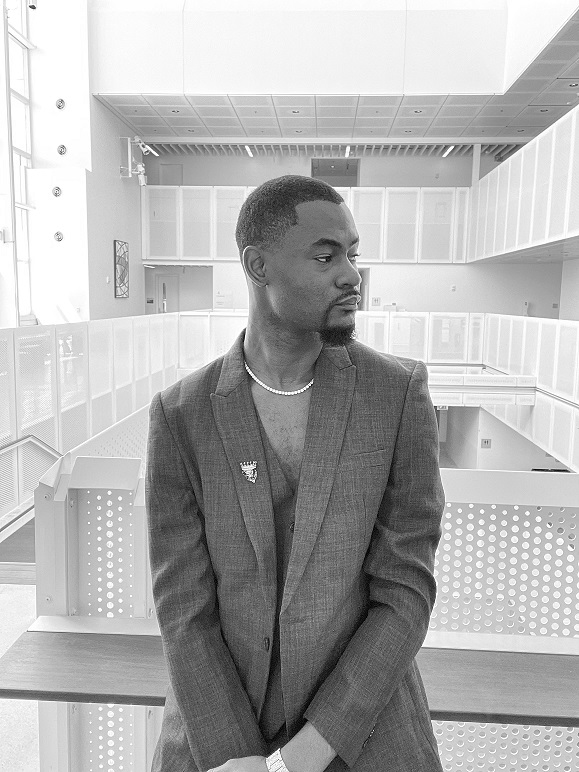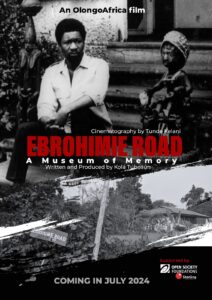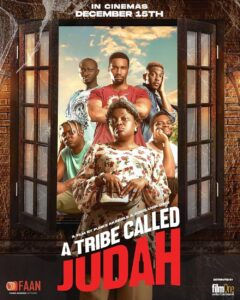Ife begins with the eponymous character, a young woman in front of her bedroom mirror, sensual, holding her waist-length braids. In the next few frames, as she sits, views herself from different angles, stands, we get a strong impression of who she is as a person, the type of woman she could be. A WhatsApp message and she descends the stairs and, at the door, pauses, and opens it. It’s a visitor: a young woman, taller, hair shorter, and Ife is visibly smitten by her. Their first meeting begins in shyness. Ife, a bad cook, tells the woman, Adaora, that she eats her mother’s food, and Adaora asks if her mother doesn’t lecture her about learning to cook for her future husband, and Ife chuckles, determined: “My mom knows I’m never marrying a man.”
Ife is a landmark film in Nigerian cinema because it realistically depicts two women in love in a country with homophobic laws—the first such film to do so—a country with a culture of sexism that reduces women to marriage prospects for men. In the course of its 35 minutes, it gives the women agency, but also observes how these conniving, silencing factors, together with those of family, privilege, and individual will, brutally come to bear over two days of dialogue, teases, and, ultimately, an unexpected and tearing confession in one bourgie Lagos apartment.
The film arrives in an expanding context of art exploring LGBTQ experiences. Ten years after Jude Dibia’s Walking with Shadows (2005) became the first Nigerian novel to explore what it means to be gay, Chinelo Okparanta’s Under the Udala Trees (2015) did the same for lesbian experiences. In fashion came A Nasty Boy magazine. Film caught up when the activist group The Initiative for Equal Rights (TIERS) released Hell or High Water (2017), a short feature about a pastor’s tussle between religion and desire, starring Enyinna Nwigwe and Daniel K. Daniel. It is refreshing that Ife, directed by Uyaiedu Ikpe-Etim and produced by the activist group The Equality Hub founder Pamela Adie (the subject of Nigeria’s first documentary about being lesbian, 2019’s Under the Rainbow), skips that valley of struggle and climbs a hill of freedom.
As Ife, Uzoamaka Doris Aniunoh (of MTV’s Shuga and NdaniTV’s Rumour Has It) sucks you in with her strong face and sensual movement. She brings a repertoire of sexiness and grit, rawness and grace. But such is the feel of that first impression that she is seen working to be shy, tempering her strong features, before Cindy Amadi’s Adaora, a love interest who is not as interesting in her first film role. Their chemistry tries to compensate for that, and is more relatable than most depictions of heterosexual love in big Nigerian movies.
Confined to one apartment, Asurf Oluseyi’s camerawork (he directed Hell or High Water) could give more visual subtext, but it opens up spaces that it then does not fill. Scenes of Ife in the kitchen, getting food and drinks for Adaora, might have been more: an unpeeling of who she is briefly away from the lovestruck presence of her new lover. But those scenes are just that: a woman getting glasses in the kitchen, with her face, the film’s strongest feature, not always focused on.
Ife is an intellectual film, the third such notable feature out of Nollywood in 2020, after Citation and Oloture, both also about the female experience in Nigeria. The characters are readers, which in Nigerian cinema equals rare fresh air. Early on, we glimpse a copy of She Called Me Woman, the groundbreaking anthology of LBTQ Nigerian women’s real-life stories, resting opened on the bed. Ife’s friends “drink, talk, rant about the patriarchy.” The two move to the shelf and Adaora makes a case for audiobooks and recommends that Ife listen to Warsan Shire’s poetry. But before that recommendation, as they stand facing each other, they segue into a Shire poem, the room suddenly hallowed, like a chapel:
All the girls you’ve ever loved, I think I loved them, too
. . . All the bodies you’ve ever undressed
And ploughed into
Were preparing you for me
I don’t mind tasting them in the memory of your mouth.
It is a beautiful moment, like a wedding vow. It is only a matter of time before they go all the way, in a sensual scene that feels groundbreaking, fresh, and arresting. This, Ikpe-Etim’s direction answers, is how to show women having sex through female eyes. “I could fall for you, Adaora,” Ife says the morning after in the kitchen. “Does that scare you?”
In all that joyous passion, Amadi’s Adaora occasionally looks stranded. But she has a tattoo: Ugbegbe Nwanyi. “It means warrior woman,” she tells Ife. There is a riveting substory behind the tattoo, and soon we see Adaora break down. Those scenes suggest coming flashbacks, but nothing comes. We must rely on their faces to carry us through. Soon, Adaora returns the question. “Ife, is it too soon to say I might be in love with you?”
“We’re lesbians,” Ife replies, “this is the perfect time.”
These lines are catchy, and one suspects the characters might have been better conversationalists if given better dialogue. The two talk about regular lesbian quirks, and it is this that leads to a twist confession, at which point Adaora’s stranded look becomes fitting. It is the push and pull of familial loyalty and romantic love, a clash of choicelessness and privilege. And it is heartbreaking.
Ife is both a lesbian experience and, regardless of sex and gender, a simple story of modern dating. It is not interested in “making a point,” because it recognizes that the lives of LGBTQ people are not lived to make points for heterosexual conviction. Progressive LGBTQ Nigerians will have conversations about where and how Ife chooses to end its story—purely a question of perspectives—but all will agree that the film carries the torch to a place from where coming films can only blaze forward.
This, of course, terrifies the Nigerian Film and Video Censors Board (NFVCB), which rained threats from the moment the film was announced. Which is why Ife will now premiere not in cinemas nationwide but on Eh Tv Network, a digital platform for LGBTQ stories. It is a loss for cinemagoers, who have to swallow glorified Instagram skits-as-films but not witness an important story that could so easily be their sisters’ and daughters’.
In a year of homage to Nollywood classics—the sequel Rattle Snake: The Ahanna Story and the remake Nneka: The Pretty Serpent—a year in which the industry revelled in looking back, Ife hurries forward. One wonders what might have been had its makers had enough freedom. ♦






One Response
Pls make it easy for those of us who want to watch this movie because of its captivating story line.
I want to see it.
Thanks 💕